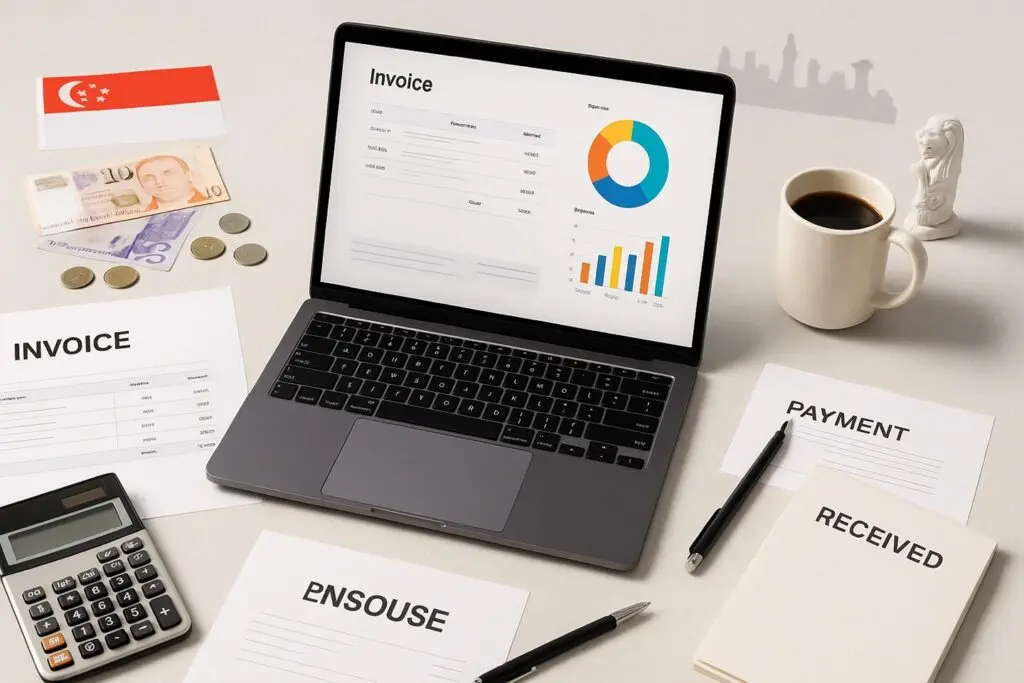Choosing the right accounting and invoice software is a foundation for sustainable business growth in Singapore. Not only are streamlined, compliant financial records required for tax and regulatory obligations, but they’re also a key driver of efficiency and business agility, especially in an increasingly digital-first marketplace. From small businesses just starting out to established agencies, selecting a software solution that fits your needs helps you manage cash flow, keep accurate records, reduce errors, and create a more professional impression with clients and partners.
With evolving government initiatives promoting digital billing and tax systems (such as IRAS e-invoicing and GST requirements), staying current is no longer optional — it’s essential for winning contracts and remaining competitive. Beyond compliance, businesses in Singapore that embrace modern invoice software unlock advantages like automation, faster payment cycles, and actionable insights that can mean the difference between merely surviving or thriving.
For more insights into the sweeping changes happening in business payments and why choosing forward-thinking software in Singapore matters, check out our guide on The Future of Business Payments.
Types of Accounting and Invoice Software: Understanding Your Options
Singapore businesses enjoy a wide range of accounting software solutions, each with its own strengths and drawbacks. Understanding the main categories not only ensures you’re fully informed but also helps align your choice to your business accounting needs.
- Cloud-Based Accounting Software: Offers access anytime, anywhere via web or app. With automatic updates, real-time collaboration, and minimal IT maintenance, most modern businesses—especially those with distributed or hybrid teams—prefer this option. However, it relies on internet connectivity and requires trust in remote data storage.
- Desktop Accounting Software: Runs on a specific computer. This can be a great fit if you need to operate fully offline or have heightened data privacy requirements, but lacks instant access or easy updates. Some legacy businesses still rely on this model, but it may not suit companies looking to grow or modernize.
- Hybrid Solutions: Combine desktop and cloud features, offering some of the flexibility of cloud with the control of desktop. Hybrid setups can be effective for companies in transition or with niche requirements, but the combination may introduce complexity.
- Software as a Service (SaaS): Subscription-based solutions fully managed by the provider. These options lower upfront costs and offer easy scalability, making them an increasingly popular choice among SMEs and startups in Singapore.
Adopting the right accounting software for business boils down to balancing accessibility, security, and practical needs. Learn more about the differences in our article: Cloud vs. Traditional Accounting.
Key Features to Look for in Invoicing and Accounting Software
There’s no shortage of invoicing and accounting software options available in Singapore, but the most effective solutions share a few vital features. Here’s what to look for when evaluating your next software for business:
- Automated Invoicing: Accounting tools that generate, send, and track invoices automatically free up time and reduce manual errors in business operations.
- Multi-Currency Support: Essential for business owners serving regional or global clients, ensuring accuracy in every transaction.
- GST Compliance: Singapore’s tax regulations are strict; reliable software should automatically apply GST rules and generate compliant reports.
- Expense Tracking: Automatic categorization and tracking of business expenses simplifies bookkeeping and improves financial oversight.
- Integration Capabilities: Compatibility with popular payment gateways, banks, and other business tools is key for seamless workflows.
- Customer Management (CRM): Maintaining client details, transaction history, and communication logs inside your invoicing software streamlines support and relationship management.
- Recurring Invoices & Subscription Billing: For service-based businesses or agencies, recurring invoices take the pain out of monthly or project-based billing.
- Customizable Templates: Branded, professional invoice templates enhance credibility and adapt to your company’s image.
- Robust Reporting: Dashboards, financial reports (P&L, balance sheets, trial balances), and analytics empower informed business decisions.
- Scalability: As your business grows, ensure your accounting software scales with increasing transaction volume and team size.
When you’re reviewing your software shortlist, these features that make invoicing software more robust can also help your business stay organized and get paid faster. For actionable tips on making the most of these tools, visit Best Practices That Utilize Your Invoice Management System.
Factors to Consider When Selecting the Right Accounting Software for Your Business in Singapore
Selecting the right accounting software isn’t just about features—it’s about finding a solution that truly fits your business and its ambitions. Consider the following as you weigh your decision:
- Ease of Use: Intuitive navigation, guided workflows, and accessible support can make all the difference, especially for small teams with limited IT resources.
- Cost: Both upfront and ongoing expenses count. Weigh the pricing structure (subscription, per user, etc.) against your budget and expected growth.
- Scalability: Can the solution easily grow with your team and transaction volume?
- Local Support: Singapore-based customer support and local resources can be invaluable for troubleshooting and regulatory questions.
- Compliance: Built-in GST, IRAS compatibility, and automatic local tax updates help your business avoid fines and late filings.
- Integration: Seamlessly connect with other accounting tools to streamline business operations. Direct connections to your bank or payment processors streamline cash flow and reconciliation.
- Customer Service: Responsive, knowledgeable support goes a long way, especially during onboarding or tax season.
Take a moment to map out your current workflows, pain points, and future plans. Try to pick a solution that not only solves today’s problems, but also positions your business for tomorrow’s opportunities. For a deeper dive on how to make the best choice, our post on How to Choose an Accounting Service offers additional helpful advice.
Quick Comparison of the 10 Best Invoicing Software in Singapore for 2025
| Software Name | Best For | Starting Price (SGD/month) | Key Features | Pros/Cons
|
|---|---|---|---|---|
| Invoice Crowd | Small businesses, agencies, freelancers | $13 | Custom invoicing, multi-currency, recurring billing, proposal builder, expense tracking | Pros: Ideal for small and medium-sized businesses looking for effective accounting solutions. User-friendly, highly customizable, great support
Cons: Not as established as old players |
| Xero | SMEs, Accountants | $33 | Comprehensive accounting, GST, integrations, automation | Pros: Popular in SG, strong integrations
Cons: Add-ons can get costly |
| QuickBooks Online | SMEs of all sizes | $20 | Invoicing, bank syncing, auto-categorization | Pros: Scalable, robust feature set
Cons: Learning curve for beginners |
| MYOB | Accountants, retail businesses | $26 | Advanced reporting, inventory, payroll | Pros: Localized, strong inventory
Cons: Desktop version legacy feel |
| Sage Business Cloud | Growing SMEs | $20 | Project tracking, invoicing, automation | Pros: Custom fields, scalability
Cons: Advanced features can be complex |
| Financio | Micro-SMEs, freelancers | $10 | e-Invoicing PEPPOL, GST, cloud-based | Pros: Affordable, Peppol ready
Cons: Relatively limited integrations |
| Zoho Books | Service businesses | $20 | Automation, time-tracking, GST, integrations | Pros: All-in-one, good mobile apps
Cons: Some advanced features paid only |
| Wave | Freelancers, startups | Free | Free invoicing, payroll (add-on), simple accounting | Pros: No cost, easy to use
Cons: Limited reporting/SG support |
| Netsuite | Large enterprises | Custom quote | ERP integration, deep analytics, customization | Pros: Powerful, highly scalable
Cons: Pricing, overkill for small teams |
| FreshBooks | Freelancers, creative agencies | $15 | Time tracking, project invoicing, expenses | Pros: User-friendly UI, good for creatives
Cons: Core accounting less advanced |
The 10 Best Invoicing and Accounting Software Solutions in Singapore
Invoice Crowd
Invoice Crowd is a cloud-based accounting software designed for small businesses, agencies, and freelancers seeking a modern solution for financial management. Its flexible invoicing tools enable users to create, customize, and send invoices in multiple currencies, making it well-suited for Singapore’s globalized business environment.
- Key Features:
- Customizable, professional invoices (see more)
- Multi-currency support Ideal for business owners with cross-border clients.
- Recurring billing and subscription management (see more)
- Proposal builder with digital signature support
- Built-in expense tracking and robust reporting
- Product & service packages for easy upsell (see more)
- Team collaboration and customer portal
- Pros:
- User-friendly, fast learning curve
- Deep customization and branding options
- Cons:
- Smaller ecosystem compared to legacy competitors
- Some advanced features may be more than sole traders need
- Ideal Users: business owners of small and medium-sized businesses. Solopreneurs, agencies, digital businesses, and small enterprises looking for scalable, automated invoicing and accounting software in Singapore.
Xero
Xero is a popular accounting software choice among Singapore’s small and medium-sized businesses for its all-in-one cloud-based software. The software combines user-friendly navigation with powerful accounting features, including direct IRAS connectivity.
- Key Features:
- Automated invoicing and bank reconciliation
- Singapore GST compliance
- Large ecosystem of integrations (payments, payroll, CRMs)
- Live dashboards and reporting
- Pros:
- Widely trusted, extensive local support
- Flexible, scalable packages
- Cons:
- Pricing adds up with premium addons
- Advanced features sometimes require accountant’s help
- Ideal Users: SMEs, professional services, accountants wanting bank-grade automation and compliance.
QuickBooks Online
QuickBooks Online by Intuit is a global leader in accounting software, popular among Singaporean small businesses for its scalability and robust features.
- Key Features:
- Customizable invoices and automated payment reminders
- Bank connection and auto-categorization
- Reporting, GST compliance, and expense management
- Mobile app for business on-the-go
- Pros:
- Can grow with your business
- Strong ecosystem of integrations
- Cons:
- Learning curve for complex accounting needs
- Local support may be limited compared to larger SG brands
- Ideal Users: SMEs needing reliable, global accounting and invoice processing.
MYOB
MYOB is an established name for companies needing accounting software solutions tailored for Southeast Asian markets, with a desktop heritage and cloud capabilities.
- Key Features:
- Inventory management and payroll features
- Singapore GST/compliance reporting
- Advanced analytics for sales and purchases are essential for small and medium-sized businesses.
- Pros:
- Localized support and strong inventory modules
- Comprehensive reporting tools
- Cons:
- Legacy desktop versions less intuitive
- Some features require upgrades/add-ons
- Ideal Users: Retailers, distributors, SMEs with inventory and payroll needs.
Sage Business Cloud Accounting
Sage is known for its reliability and adaptability, catering to both small and midsize businesses in Singapore. The cloud platform offers smart automation and robust financial controls.
- Key Features:
- Automated billing, payments, and reconciliation
- Project tracking and advanced user roles
- Customizable fields and strong reporting
- Pros:
- Easy to scale as your business grows
- Highly customizable workflows
- Cons:
- Full benefit requires setup/learning investment
- Some SG localization features require higher plans
- Ideal Users: Businesses in need of project tracking, custom workflows, and advanced reporting.
Financio
Financio is a cloud-based accounting software in Singapore designed for micro and small businesses, with a focus on affordable compliance.
- Key Features:
- PEPPOL e-Invoicing integration
- GST, payment gateway, and banking integrations
- Sales/purchase management, mobile app
- Pros:
- Priced for micro-business budgets
- Ready out-of-the-box for local compliance
- Cons:
- Limited advanced extensions for scaling
- Primarily focused on Singapore/Malaysia
- Ideal Users: Startups, freelancers, and micro-SMEs aiming for quick, affordable e-invoicing adoption.
Zoho Books
Zoho Books delivers a feature-rich invoicing and accounting solution that integrates seamlessly with the Zoho ecosystem and numerous third-party tools.
- Key Features:
- Automation across quotes, invoices, and expense tracking
- Built-in GST compliance
- Time-tracking, project management, inventory modules
- Pros:
- Great all-in-one offering for services companies
- Excellent mobile and web experience
- Cons:
- Premium features come with higher plan tiers
- Very small teams may find it a bit feature-heavy
- Ideal Users: Service providers and growing businesses using Zoho tools or needing automation.
Wave
Wave’s core proposition is its free invoicing software model, loved by freelancers, bootstrapped startups, and small service providers.
- Key Features:
- No-cost basic invoicing and accounting
- Optional paid payroll and payment processing
- Automatic transaction import
- Pros:
- A truly free option for basic needs
- Simple to use; quick setup
- Cons:
- Limited reporting and customization
- Support and features not fully tailored to Singapore
- Ideal Users: Freelancers and solo entrepreneurs just starting out or with simple needs.
Netsuite
Netsuite, by Oracle, is a comprehensive ERP system with integrated accounting features for large, complex business structures—often favored by established enterprises and multi-entity firms.
- Key Features:
- Enterprise resource planning and deep financial controls
- Multi-subsidiary, multi-currency, and advanced automation enhance the accounting process.
- Highly customizable workflows
- Pros:
- Powerful reporting, analytics, and scalability
- Global support and integrations
- Cons:
- Cost may be prohibitive for SMEs
- Complex implementation and learning curve
- Ideal Users: Enterprises and fast-scaling organizations needing all-in-one ERP plus accounting.
FreshBooks
FreshBooks stands out for its simplicity and focus on creative professionals and service-based businesses who need intuitive invoicing software in Singapore.
- Key Features:
- Professional invoicing with expense tracking
- Time-tracking and project billing for teams
- Automated late payment reminders
- Pros:
- User-friendly UI and mobile apps
- Project invoicing for multi-client work
- Cons:
- Not as full-featured for larger businesses
- Some accounting tasks require external add-ons
- Ideal Users: Designers, writers, agencies, sole traders seeking fast and easy invoice processing.
Comparing the Best Accounting and Invoicing Software: Strengths and Limitations
Each of the 10 best accounting software options brings its own unique set of strengths and limitations. Invoice Crowd shines with customization and affordability, making it ideal for fast-growing digital businesses and agencies. Xero is celebrated for compliance and local ecosystem support, while QuickBooks Online offers scalability and powerful automation. MYOB caters to retail and legacy environments with inventory management, whereas Sage stands out for customizability and project tracking.
Financio and Wave are tailored for micro-SMEs, offering affordability or even a no-cost entry. Zoho Books caters to service providers who need seamless automation, while Netsuite provides enterprise-scale integrations and analytics. FreshBooks, with its friendly interface, prioritizes small creative teams and freelancers.
Ultimately, the best choice hinges on mapping your business needs: freelancers might find FreshBooks, Wave, or Invoice Crowd more approachable, while established SMEs lean toward Xero, QuickBooks, or Sage. Enterprises with complex structures often favor Netsuite. For more tailored recommendations, visit our list of 10 Best Invoicing and Accounting Software for Small Business.
How the Right Invoicing Software Can Transform Your Business Processes
The right accounting solution doesn’t just save you time—it can fundamentally change how you operate and grow your business. For example, automating recurring invoices and payment reminders can drastically reduce late payments and manual follow-up. Businesses serving international clients benefit from seamless multi-currency billing and direct payment gateway integrations, while robust reporting simplifies tax season and guides smarter decision-making.
A typical use case: a digital agency sets up recurring monthly invoices for retainer clients using Invoice Crowd. Integration with local payment gateways means payments are received faster, and automated reminders reduce collection efforts. Expense tracking and essential financial reports help the agency’s leadership keep a close pulse on profitability and cash flow, all within a single dashboard.
For more use cases and insight into how automated invoicing can deliver results, explore our guide on 11 Ways in Which Invoice Automation Adds Value.
Frequently Asked Questions: Accounting and Invoicing Software in Singapore
- How much does invoicing software cost in Singapore? Prices can range from free (Wave) to $10–$40 SGD/month for most SMEs, with enterprise solutions like Netsuite requiring custom quotes.
- Is GST compliance automated in these solutions? Most major software, such as Invoice Crowd, Xero, and QuickBooks, automatically apply Singapore GST rules and generate relevant reports.
- Can I migrate my data from my old system? Most leading cloud-based accounting software offers import tools or onboarding assistance for a smooth migration.
- Are these platforms secure? Yes, reputable providers use bank-level encryption and data protection. Always look for explicit security certificates and user permission controls.
- Can I customize invoices and reports? Most modern solutions provide fully customizable templates, branded documents, and flexible financial reports to suit your business needs.
- Which platforms integrate with local banks and payment gateways? Software like Invoice Crowd, Xero, and Financio offer connections to leading banks and payment processors in Singapore, streamlining your financial workflow.
For reasons to choose specialized invoice software over basic templates, see The Benefits of Using Billing Software vs Invoice Templates for small and medium-sized businesses..
Conclusion: Selecting the Best Accounting and Invoicing Software for Your Business Success
Selecting the right accounting software can sharpen your competitive edge, help ensure compliance, and empower your business as it scales. As explored, every platform excels in particular areas—prioritize the features, pricing, and support that best align with your vision and growth plans. Whenever possible, take advantage of free trials or demo accounts before making a final investment.
If you’re ready for a tailored, scalable solution built specifically for small businesses and freelancers seeking smart growth in Singapore, discover Invoice Crowd and sign up for a free trial. The right software could be the game-changer your business needs.


